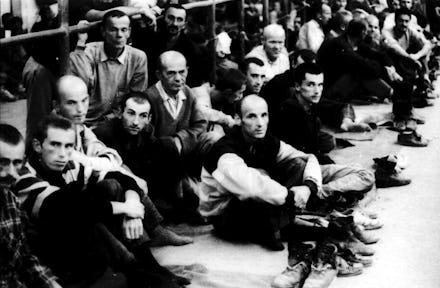What are the Geneva Conventions? 4 ways Trump is obliterating the way we treat war.

German Chancellor Angela Merkel criticized President Donald Trump's executive order to temporarily ban immigrants and visitors from seven Muslim-majority countries and create a four-month hold on all refugees seeking entry into the United States. In a Jan. 28 phone call, Merkel explained to Trump the obligations of the Geneva Conventions regarding refugees, according to the Guardian.
This is not the first time Trump has gotten schooled on the importance of respecting the Geneva Conventions. During a GOP presidential debate hosted by CNN in December 2015, Trump said he'd kill the families of ISIS members, to which Sen. Rand Paul later responded: "If you are going to kill the families of terrorists, realize that there's something called the Geneva Convention we're going to have to pull out of. It would defy every norm that is America."
So, what are the Geneva Conventions?
Created in 1949 after World War II, the Geneva Conventions are a set of treaties that champion the humane treatment of civilians, soldiers and prisoners during times of war.
The first convention protects wounded and sick combatants on land during war, as well as medical and religious personnel, medical units and medical transports. The second protects shipwrecked servicemen at sea during war, while the third defends prisoners of war. The fourth Geneva Convention grants protection to civilians in enemy or occupied territories. Each of the conventions also contains a common Article 3 tackling noninternational civil conflicts or armed conflicts that spill over into other countries, as well as internal conflicts in which third-party states or multinational forces intervene alongside the government.
The Additional Protocols of 1977 relate to the protection of victims of armed conflicts; the 2005 Additional Protocol III discusses the adoption of an "additional distinctive emblem" — such as the red cross or red crescent — to signify assistance for victims of armed conflicts.
The Geneva Conventions still play a pivotal role in the implementation of international humanitarian law, but not everybody applauds their rules. Past statements from Trump suggest he's one of them.
Here is a list of Trump's actions that directly conflict with the Geneva Conventions.
1. On waterboarding
During a town hall meeting in March, Trump said the Geneva Conventions hinder the fighting capacity of the U.S. military.
"The problem is we have the Geneva Conventions, all sorts of rules and regulations, so the soldiers are afraid to fight," Trump said, according to Politico. With respect to torture, Trump added, "We can't waterboard, but they [the Islamic State] can chop off heads. ... I think we've got to make some changes, some adjustments."
Now that he's president, Trump appears ready to stand by his promise. A draft executive order, should it be issued, would allow the CIA to implement brutal interrogation techniques in secret prisons, Vox reported Friday. During an interview with ABC anchor David Muir on Wednesday, Trump said he would consider reinstating banned interrogation methods.
2. On prisoners of war
When then-GOP candidate Trump appeared at Iowa's Family Leadership Summit in July 2015, he said Sen. John McCain was not a true hero.
"He was a war hero because he was captured," Trump said. "I like people who weren't captured."
McCain, who spent roughly five-and-a-half years in a notorious Vietnamese prison where he was tortured, told MSNBC at the time that Trump owed "an apology to the families of those who sacrificed in conflict," but Trump later insisted he didn't regret his statement.
Under the third Geneva Convention, prisoners of war are to be released and repatriated without delay following the end of hostile activities.
3. On the Israeli settlements
On Jan. 22, Israel — encouraged by Trump — announced the construction of 566 housing units in East Jerusalem. Two days later, the Israeli government announced the creation of 2,500 settlement homes in the West Bank. Nearly 100 settlement homes will be located in the Beit El settlement, which received a $10,000 donation from Trump in 2003.
Although the United Nations Security Council allowed a resolution condemning Israeli settlements in December, Trump asked then-President Barack Obama to exercise the United States' veto power to block the resolution.
Seemingly unbeknownst to Trump, the International Committee of the Red Cross states that "It is unlawful under the fourth Geneva Convention for an occupying power to transfer parts of its own population into the territory it occupies. This means that international humanitarian law prohibits the establishment of settlements, as these are a form of population transfer into occupied territory."
4. On taking oil from Iraq
During his Wednesday interview with ABC's Muir, Trump claimed there would be no ISIS if the United States had taken Iraq's oil.
"We should have taken the oil," Trump said. "You wouldn't have ISIS if we took the oil. Now I wasn't talking about it from the standpoint of ISIS because the way we got out was horrible. We created a vacuum and ISIS formed."
Trump made similar remarks when he was running for president, prompting international humanitarian law experts to question his proposal.
"Under the fourth Geneva Convention, when you are an occupying power, you are a caretaker, you are administering the territory," Laurie Blank, director of the Emory University School of Law's International Humanitarian Law Clinic, told the Wall Street Journal in September 2016. "The idea is to keep it as close to status quo as possible and give it back. It's not yours to do with it what you want."